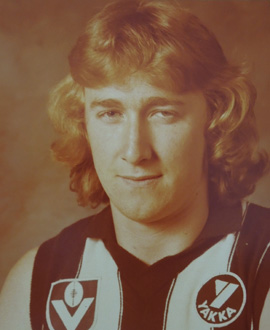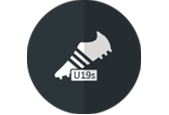

At first glance, Terry Philippe’s career seems to have had a familiar ark: a gun junior who was a prolific goalkicker in the lower grades, but who could never quite translate that into goals at senior level.
But the reality of Terry’s footballing journey is much more complex than that.
It started conventionally enough, born into a Collingwood-supporting family in West Heidelberg. He went to Heidelberg Heights Primary School, then Latrobe High School, and always found himself drawn to the forwards at footy, his favourite players being Peter McKenna and Terry Waters. He played junior footy with Heidelberg West, then left the game for a couple of years, but by age 15 was playing with the seniors at Heidelberg North.
Collingwood scouts spotted him there and he was asked to play with the under-19s late in the 1974 season. But coach Des Healey told him to return in 1975, and when he did so he immediately made a name for himself, playing mostly at full-forward and centre half-forward and topping the goalkicking table with 46 goals from 15 games. But that was only the start: he also managed to kick 25 goals from 11 reserves games (finishing third in their goalkicking) and twice being named an emergency for the senior side. It was a remarkably quick ascension.
A strong, hulking figure, Terry always seemed destined to play either the ruck or key forward. He had a wonderful leap, sticky hands and was an agile mover around the ground, making him a tricky proposition to match up against. He readily admits he wasn’t the world’s greatest trainer, but after a stellar first season he seemed poised to make a big impact in 1976.
Instead, he decided to go back to North Heidelberg. Even now it seems a surprising decision, and it’s one he admits he regrets. But he had two brothers playing at North Heidelberg, and nobody around to suggest that it might not be the wisest move. He also lacked confidence, and even after that impressive debut season struggled to believe he truly belonged at senior VFL levels.
After a good year back in suburban footy, though, he returned to Victoria Park in 1977 under new coach Tommy Hafey, and took up where he had left off, kicking 74 goals for the season in the reserves without quite being able to crack it for a game in a senior team heading for the Grand Final.
But in 1978 he was thrown into defence and, eventually, his opportunity came – on the interchange bench against St Kilda in the Rd 10 clash at Waverley in front of more than 70,000 fans. He was on the bench again the next week, and finally got his first starting berth against Geelong the week later. But his resurgence as a defender was brutally halted in that game when he received a fractured skull from a stray boot.
Incredibly, he missed only three games and returned via the seconds sporting a protective boxing helmet, in a remarkable feat of courage that drew him back page headlines from The Sunday Observer, highlighted alongside golfer Bob Shearer as two “Victorian sports heroes who had cheated death”. By now he was beginning to feel a little more at home at centre half-back and he was soon back in the seniors, playing two good games in defence before the end of the season but unable to hold his spot for the finals.
Once again, Terry seemed ready to make a bigger mark at Collingwood. Once again though, he left. His itchy feet and lack of belief got the better of him, and he moved to West Perth as part of the Bill Valli swap deal. And that’s where his VFL story ended: he injured his knee in the West, returned home in 1980 and didn’t really play much footy for the next few years.
He returned to footy with Heidelberg, and then spent 1984-85 with Daylesford under old teammate Bruce Gonsalves. He showed he’d lost none of the goalkicking prowess that had marked his early career, kicking 14 in his first game and notching the fastest ton in Ballarat League history (12.5 games), then following up with another ton in ’85. He then moved to Camperdown, where he kicked 90 in his first year, and later again would coach Rye.
It's hard not to look at Terry Philippe’s stop-start Collingwood career and wonder what might have been. What if he had stayed at Victoria Park to develop further in 1976? Or again after his debut senior season in 1978? What if he had been encouraged and nurtured in the same way players are today? There was no doubt he had the talent, and oodles of courage. Instead we just got a tantalising glimpse of a player who could have been a force at both ends of the ground.
- Michael Roberts
CFC Career Stats
| Season played | Games | Goals | Finals | Win % |
|---|---|---|---|---|
| 1978 | 5 | 1 | 0 | 60.0% |
CFC Season by Season Stats
| Season | GP | GL | B | K | H | T | D | Guernsey No. | ||
|---|---|---|---|---|---|---|---|---|---|---|
Other CFC Games
| Team | League | Years Played | Games | Goals |
|---|---|---|---|---|
| Collingwood | Reserves | 1975 - 1978 | 47 | 104 |
| Collingwood | U19s | 1975 | 15 | 46 |
Awards








